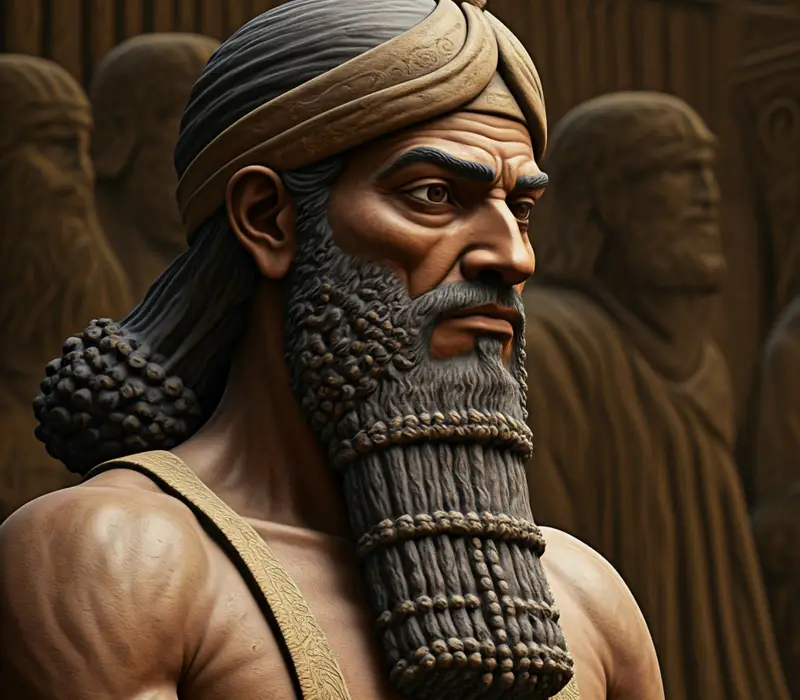Enkidu: The Mythical Wild Man of Ancient Mesopotamia

Enkidu - A Symbol of Wilderness and Civilization
Enkidu is one of the most fascinating figures in Mesopotamian mythology, embodying the raw force of nature and the transformative power of friendship. He appears in the Epic of Gilgamesh, one of the oldest surviving pieces of literature, originating from ancient Sumer in what is now modern-day Iraq. Enkidu’s story is not just a tale of adventure but a profound exploration of humanity, morality, and the bond between man and nature.
In this article, we delve into the legend of Enkidu, from his creation by the gods to his life-altering friendship with Gilgamesh, the legendary king of Uruk. Travelers to Iraq can connect with this mythical figure by exploring the ancient ruins of Uruk and the cultural heritage of Mesopotamia.
1. The Creation of Enkidu: A Divine Answer to Tyranny
Enkidu was created by the goddess Aruru, the mother of creation, at the request of the gods. The gods sought to curb the tyranny of King Gilgamesh, who was abusing his power in Uruk. Aruru fashioned Enkidu from clay, shaping him as a wild and untamed being who roamed the wilderness with animals.
The Characteristics of Enkidu:
- Connection to Nature: Enkidu lived among wild beasts, eating grass and drinking from rivers like an animal. His life symbolized freedom and a deep connection to the natural world.
- Immense Strength: As a being crafted by the gods, Enkidu possessed extraordinary strength, rivaling that of Gilgamesh.
2. The Civilizing of Enkidu
The transformation of Enkidu from a wild man to a member of human society is one of the most significant episodes in his story. The gods sent a woman, Shamhat, to civilize him. Shamhat, a temple prostitute, used her wisdom and charm to teach Enkidu about human culture.
Key Events:
- The Role of Shamhat: Through Shamhat, Enkidu learned about the ways of humanity, including speech, clothing, and the concept of companionship.
- Loss of Innocence: After his encounter with Shamhat, Enkidu lost his ability to communicate with animals, symbolizing his transition from wilderness to civilization.
This transition reflects a central theme in Mesopotamian literature: the balance between nature and civilization, and the sacrifices inherent in becoming "human."
3. Enkidu and Gilgamesh: A Legendary Friendship
After his transformation, Enkidu traveled to Uruk, where he challenged Gilgamesh. Their initial confrontation was fierce, but it ended in mutual respect and friendship. Together, they embarked on legendary adventures that are immortalized in the Epic of Gilgamesh.
Their Adventures:
- Defeating Humbaba: Gilgamesh and Enkidu ventured to the Cedar Forest, where they faced Humbaba, the fearsome guardian of the forest. With bravery and unity, they defeated him, symbolizing humanity’s triumph over the wild.
- Slaying the Bull of Heaven: When the goddess Ishtar sent the Bull of Heaven to punish Gilgamesh, Enkidu stood by his friend. Together, they vanquished the bull, further solidifying their bond.
4. The Tragic Death of Enkidu
Enkidu’s death is one of the most poignant moments in Mesopotamian mythology. After angering the gods by killing the Bull of Heaven, the gods decreed that Enkidu must die as punishment.
The Impact of Enkidu’s Death:
- Gilgamesh’s Transformation: Enkidu’s death deeply affected Gilgamesh, propelling him on a quest for immortality and self-discovery.
- Themes of Mortality: Enkidu’s demise highlights the inevitability of death and the fragility of life, themes central to the Epic of Gilgamesh.
Enkidu’s death serves as a turning point in the epic, marking the shift from heroic adventures to existential reflection.
5. The Legacy of Enkidu in Mesopotamian Culture
Enkidu’s story transcends his role in the Epic of Gilgamesh, reflecting deeper cultural and philosophical ideas that resonate to this day.
Symbolism of Enkidu:
- Nature vs. Civilization: Enkidu represents the balance between the untamed natural world and the structured human society.
- Friendship and Humanity: His bond with Gilgamesh highlights the transformative power of friendship in overcoming personal flaws and achieving greatness.
- Mortality and Meaning: Enkidu’s story invites reflection on life’s impermanence and the quest for meaning in the face of mortality.
6. Exploring Enkidu’s Legacy in Iraq
For travelers interested in the rich history of Mesopotamia, exploring the ancient sites connected to Enkidu’s story is an unforgettable experience.
Sites to Visit:
- Uruk (Modern Warka): The legendary city of Gilgamesh, where visitors can walk among ruins that witnessed the dawn of civilization.
- Cedar Forest Region: While the exact location of the Cedar Forest is unknown, references to it highlight the natural beauty of the Mesopotamian landscape.
- The Iraqi Museum in Baghdad: Home to numerous artifacts from Sumerian and Akkadian periods, offering a glimpse into the world of Enkidu and Gilgamesh.
7. The Relevance of Enkidu Today
Enkidu’s story continues to inspire people worldwide. His journey from nature to civilization, his profound friendship with Gilgamesh, and his ultimate sacrifice resonate with universal human experiences.
For modern audiences, Enkidu’s tale offers timeless lessons about self-discovery, the importance of connection, and the delicate balance between human progress and our relationship with the natural world.
By exploring the myth of Enkidu, visitors to Iraq can connect not only with the ancient past but also with universal themes that continue to shape human understanding. Mesopotamia, the land where these stories were born, remains a testament to the enduring power of myth and history.